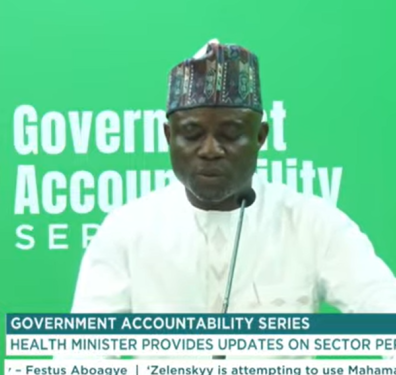
Govt to clear backlog of 70000 unemployed health workers. Ghana’s Minister of Health, Hon. Kwabena Mintah Akandoh, has expressed the government’s unwavering commitment to tackling the rising unemployment situation among health professionals in the country. He made this statement during the Government Accountability Series held on Friday, July 18, where he acknowledged the scale of the problem and outlined specific actions being taken to address it.
Speaking candidly during the event, the minister admitted that the country is currently facing a substantial backlog of unemployed yet qualified health personnel. According to him, over 70,000 trained and certified health professionals are presently awaiting employment. This includes nurses, midwives, pharmacists, and other essential healthcare workers.
“We recognise the challenge of over 70,000 qualified health workers currently awaiting employment,” Mr. Akandoh said. “But I want to assure you that we are working tirelessly to clear this backlog.”
In what he described as a significant step forward, the minister disclosed that the government has already made notable progress in reducing the numbers. He revealed that in just the past six months alone, over 10,000 nurses and midwives have been absorbed into the healthcare system. This recruitment exercise, he explained, is part of a broader and continuous plan to expand the country’s health workforce in phases.
He also addressed the growing frustration among pharmacists who have completed their professional training and are awaiting clearance and placement. The minister specifically mentioned that the government is now processing salary arrears for 321 Pharmacist House Officers who completed their training in 2024. He assured that these arrears would be settled promptly to pave the way for full employment and integration into the health sector.
“While 1,621 qualified pharmacists await permanent employment, we are prioritising their recruitment as part of strengthening our health workforce,” the Minister added.
Mr. Akandoh acknowledged the emotional and financial toll the waiting period has had on many unemployed professionals, but encouraged them to remain hopeful as the government rolls out more inclusive employment strategies. He pointed out that health professionals form a vital part of the nation’s development, especially in light of the lessons learned from the COVID-19 pandemic, which highlighted the urgent need to strengthen Ghana’s health system.
He emphasized that the government is not only focusing on one category of healthcare workers but is looking at a holistic approach that includes all cadres—ranging from nurses and midwives to laboratory technicians, physician assistants, and public health officers.
“We are not leaving anyone behind. This is just one example of our broader commitment to clearing the backlog across all health worker cadres. Our goal is to ensure every qualified professional has the chance to serve and contribute to strengthening Ghana’s health system,” the Minister stressed.
He reiterated that ensuring the prompt employment of health professionals is not only a matter of fairness but also critical to achieving universal health coverage and improving health outcomes in both rural and urban communities.
The Health Minister concluded by calling on stakeholders, including the Ministry of Finance and the Ghana Health Service, to continue supporting the recruitment agenda through prompt resource allocation and administrative cooperation. He noted that while the road ahead may be challenging, the government remains resolute in its mission to restore hope to Ghana’s health professionals and revitalize the national health sector.
Govt to clear backlog of 70000
In summary, the government’s recent efforts reflect a growing recognition of the value of health workers and an acknowledgment that their contributions are essential to national development. With over 10,000 health professionals already employed this year and more to follow, it appears that steps are indeed being taken to resolve one of the most pressing challenges facing Ghana’s healthcare workforce today.


